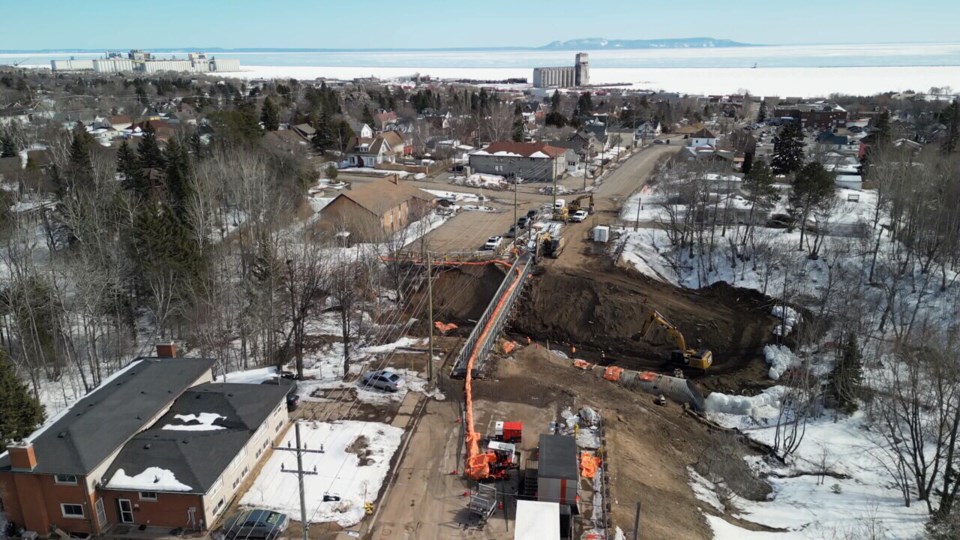THUNDER BAY — The replacement of a culvert on River Street continues to cause headaches for the city months after the roadway was finally reopened to motorists.
The project will cost the city about $326,000 more than the $2.5-million “upset limit” approved by city council last year, a report published on Wednesday reveals.
Council will receive the report on Monday, considering a recommendation to increase the upset limit and cover the difference using funds allocated for work on the McKellar Bridge that was budgeted in 2023 but will not go forward until at least next year.
The report, prepared by the city’s engineering division based on final invoices from Taranis Contracting, indicates the total project cost at over $3.1 million. After a municipal HST rebate, the total cost to the city is pegged at just over $2.8 million.
The report cites factors including cold weather work, undulating bedrock profiles that forced changes to levelling slabs, and unexpected water and sewer work in explaining the overage.
River Street was closed on May 5, 2022, after a large sinkhole developed, caused by a failure of one of the twin culverts that carry the waters of McVicar Creek.
The project experienced multiple delays that kept the arterial roadway closed between Peter and Farrand streets for nearly a year-and-a-half.
That section of River Street reopened in late September.
In the meantime, the project encountered numerous challenges, including sewage backups in several nearby homes.
City project engineer Mike Vogrig said the need to bring in a backup pump to address that problem was one factor in the overages.
“The peak flows … were significantly more than we expected,” he said. “So we had to run a pump over the course of the job full-time to prevent any further flooding of houses.”
It’s also possible insurance claims against the city from residents whose homes were flooded could add further costs.
The city awarded a contract for replacement of the culvert and reconstruction of the road to Taranis in September 2022. The local company submitted the lowest of three bids on the project.
The city recovered $10,000 in “liquidated damages” from Taranis because the work ran past its targeted completion date. Vogrig called that a relatively minor issue, saying the relationship between the city and the contractor remained positive.
“The contractor in place was for the most part putting a lot of effort in, and the reason why the contract went long was because additional work was added to the job” Vogrig said. “But once we added up all those additional days we’d provided for the additional work … they still ran about two to three weeks late.”
“There were definitely some portions of time that were slow, you know, maybe they had some other work going on that was higher priority, so we got left for a day or two here or there.”
Asked what the city can learn from the project, Vogrig said many of the challenges stemmed from its emergency nature, which left the city taking some steps with only partial information.
“It's just a difficult situation when you have these unexpected replacements and there's not a lot of time to plan,” he said.
“I think the one thing I learned [is] if I could have started those discussions with utilities earlier and had some of that work planned out, which is difficult … but at least maybe start those conversations earlier to see if we could have saved a couple of weeks.
“Because we lost a lot of good weather in 2022 waiting for utility locates to get done.”
The existing twin culverts were replaced with a single multi-plate metal arch made of thicker galvanized steel. The new structure has an estimated lifespan of 75 to 90 years, the city says.
